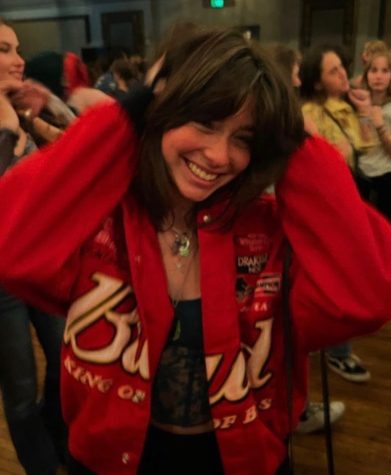Power in pink and power in numbers, the Bay Area comes together for abortion rights
October 12, 2021
On Saturday, Oct. 2, women and allies alike gathered on the corner of Hyde St. and Grove St. in San Francisco to fight back against the choices of the Supreme Court, Texan lawmakers and all those opposing a woman’s right to have an abortion. Crowds decked out in pink clothing holding drum sets, megaphones and bold signs engraved with, “Protect My Sister’s Rights,” and “We Are Not Ovary-Acting,” lined the streets. Murmurs of women’s stories and experiences radiated through the crowds. Beats of footsteps, drums and marchers generated a powerful symphony of what it truly sounds and looks like to support women.

The march was organized as a response to the newly implemented Texas abortion ban, which outlaws abortions after six weeks of pregnancy and makes all involved parties legally liable. Organizations such as the League of Women Voters of San Francisco, Planned Parenthood, San Francisco’s Women’s Political Committee and the San Francisco Human Rights Commission joined forces to plan the protest. The march went on for approximately an hour and a half and ended in front of the Ferry Building at the cross streets of Embarcadero St. and Market St. The march was accompanied by a group of police officers and volunteers in yellow vests to ensure people’s safety. Leaders of the protest projected empowering chants through megaphones and handed out informational flyers, in order to further protester’s involvement surrounding the issue of reproductive rights.
Michelle Shadel works with the Party for Socialism and Liberation, and made an appearance at the protest. The organization argues that modern social issues are a side effect of capitalism, and demands that the government adopt more socialist policies in order to combat these injustices. Shadel expressed the importance of advocating for women’s reproductive rights, and is extremely passionate about advocating against the new abortion ban.
“It’s important, especially right now, to stand up for our reproductive rights,” Shadel said. “We are here today to come together as women, show our power and demand what we need and what we want.”
Similar to Shadel, Redwood students also made the trip to the city to show their support. Lola Zirpoli and Cami Macmillin, both Redwood seniors, appeared at the march. Macmillin was prepared to express her feminism and show her devotion to the cause.
“We’re here because we are feminists, and we believe in controlling our own bodies,” Macmillin said.
Zirpoli conveyed that people of all genders, not just women, should be at the march to express their support for issues regarding reproductive rights.
“It’s important for everyone to come. People with female reproductive systems should have support from everyone,” Zirpoli said. “It’s not just a women’s issue; it’s a human issue.”
A young boy with a sign stating, “Protect my sisters rights,” proudly trailed behind his dad, mom and sister, exemplifying Zirpoli’s point that the Texas abortion ban affects people of all kinds. Families brought toddlers and babies as a way to involve their kids in a historical event, while also bringing a level of consciousness to younger generations about the modern struggle for women’s rights.

Maiyaka Marah, a mother and female rights activist, showed up to the march with her three children, and emphasized that she was there because of the high maternal mortality rate due to the lack of abortion access. Her kids all volunteered to come and Marah strongly believed it was a vital event for them to experience.
“I look at what [my childrens’] lives are going to be like if we enter a period where their rights to be who they want to be and [the ability to] control their own destinies are limited,” Marah said. “It’s not a very enticing vision.”
Marah’s son, Usher, a San Francisco high school student, was troubled with the thought that his sister’s, mother’s and friend’s reproductive rights could all be taken from them. He reiterated that men should be supporting too, even if the issue doesn’t affect them directly.
“It’s inconceivable to me that somebody would think that [abortive] rights should be taken away. I feel like the best way to show [support for women’s rights] is to go to these demonstrations,” Usher stated.
The protest ended with a united stance and empowering spirit flooding through the Bay Area advocates who participated. Many look forward to the next demonstrations to continue rallying their support for reproductive rights. To stay up to date on upcoming protests, visit the Women’s March San Francisco Eventbrite website.

























